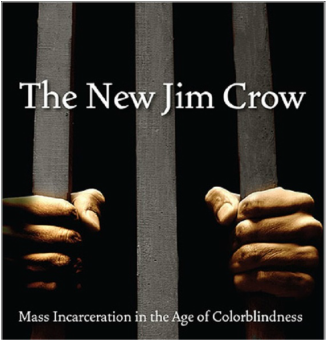 The book's main ideas are summarized in this short video clip. The book's main ideas are summarized in this short video clip. Tags: class, crime/law/deviance, inequality, prejudice/discrimination, race/ethnicity, colorblind racism, mass incarceration, prison industrial complex, war on drugs, 06 to 10 mins Year: 2013 Length: 8:23 Access: YouTube Summary: Legal scholar Michelle Alexander’s (2010) book The New Jim Crow: Mass Incarceration in the Age of Colorblindness has received critical acclaim and has quickly become a core text in many sociology classrooms. This short video highlights the main arguments advanced in the book, and features the insights and opinions of various key thinkers, scholars, and activists. As summarized on the book’s website, “The New Jim Crow is a stunning account of the rebirth of a caste-like system in the United States, one that has resulted in millions of African Americans locked behind bars and then relegated to a permanent second-class status—denied the very rights supposedly won in the Civil Rights Movement. Since its publication in 2010, the book has appeared on the New York Times bestseller list for more than a year; been dubbed the ‘secular bible of a new social movement’ by numerous commentators, including Cornel West; and has led to consciousness-raising efforts in universities, churches, community centers, re-entry centers, and prisons nationwide. The New Jim Crow tells a truth our nation has been reluctant to face. As the United States celebrates its ‘triumph over race’ with the election of Barack Obama, the majority of black men in major urban areas are under correctional control or saddled with criminal records for life. Jim Crow laws were wiped off the books decades ago, but today an extraordinary percentage of the African American community is warehoused in prisons or trapped in a parallel social universe, denied basic civil and human rights—including the right to vote; the right to serve on juries; and the right to be free of legal discrimination in employment, housing, access to education and public benefits. Today, it is no longer socially permissible to use race explicitly as a justification for discrimination, exclusion, and social contempt. Yet as civil-rights-lawyer-turned-legal-scholar Michelle Alexander demonstrates, it is perfectly legal to discriminate against convicted criminals in nearly all the ways in which it was once legal to discriminate against African Americans. Once labeled a felon, even for a minor drug crime, the old forms of discrimination are suddenly legal again. In her words, ‘we have not ended racial caste in America; we have merely redesigned it.’ Alexander shows that, by targeting black men through the War on Drugs and decimating communities of color, the U.S. criminal justice system functions as a contemporary system of racial control, even as it formally adheres to the principle of colorblindness. The New Jim Crow challenges the civil rights community—and all of us—to place mass incarceration at the forefront of a new movement for racial justice in America.” Alexander elaborates upon these ideas in more detail in her 2012 convocation speech at Carleton College, which can be found here. A trailer for the book can be found here. Submitted By: Valerie Chepp
2 Comments
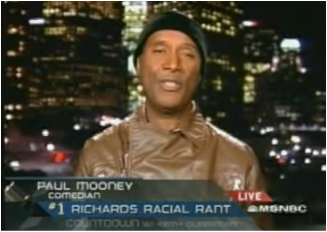 Paul Mooney explains why he stopped using the "n-word." Paul Mooney explains why he stopped using the "n-word." Tags: discourse/language, prejudice/discrimination, race/ethnicity, n-word, 06 to 10 mins Year: 2006 Length: 7:02 Access: YouTube Summary: If your classes incorporate The Wire, contemporary music, clips from stand-up comedy routines (e.g. Dave Chappelle or Chris Rock), or books like Gang Leader for a Day, your students have probably been exposed to the "n-word" in an academic context. These can offer important opportunities to engage students in a conversation about how and why the word is used in contemporary society, and if it is really ever acceptable for anyone to use the word. This is a particularly important conversation to have in today's media environment, where students are exposed to the word so frequently that many of them will become de-sensitized to its usage. This clip from Countdown with Keith Olbermann offers an opportunity to engage students on this taboo topic. The clip was done shortly after Michael Richard's (the actor who played Kramer on Seinfeld) racist rant that went off script during a stand-up routine. It provides a summary of the event, coverage of his public apology to the African-American community, and reactions from various people to the event and apology. The bulk of this clip features commentary from comedian and actor Paul Mooney, who had a particularly powerful reaction to Richards' rant. Mooney recounts how he, along with Richard Pryor, had long used the word in their comedy "to de-power the word." Mooney explains this as an attempt within the African-American community to assign new meaning to the word. However, after hearing the context in which Richards used the word, he was shocked, and has vowed to stop using the n-word in his work (he similarly notes that he won't use the "b-word" anymore). He argues that "It's time for us, as a Black race, to not be tolerated; we have to be celebrated. And I want to celebrate my Blackness and I want to take back my power ... and I want to bring back the dignity ... All people, the Latino kids, the white kids, the young Black kids, the Asians, all use that word ... and I want to just lock it up." The clip offers an important counter-weight to those who so frequently use it in their music, comedy, or everyday language--reminding us of its historical context and how that context cannot be ignored. Viewers might consider why Paul Mooney has changed his attitude about the word? What are the different positions about the word's usage within the Black community? Regardless of the performer's race, what are the negative impacts of using the word? Can we actually separate the word's contemporary usage from its historical origins? In what ways is this similar to, and different from, other racial slurs used in contemporary culture? Submitted By: Paul Dean  Cocoa farmers may go their entire lives without tasting chocolate Cocoa farmers may go their entire lives without tasting chocolate Tags: capitalism, class, food/agriculture, globalization, marx/marxism, organizations/occupations/work, theory, alienation, chocolate, cocoa farming, commodity chains, ivory coast, species-being, subtitles/CC, 06 to 10 mins Year: 2014 Length: 5:55 Access: YouTube Summary: It is quite common to hear people discuss Karl Marx's notion of alienation as a term that simply describes widespread feelings of unhappiness and psychological distress among workers. It's true that one result of alienation may be unhappiness, but the term was intended to describe much more than workers' feelings. It's important to remember that Marx wrote about alienation as a condition that arises from the social relations that form within a system of capitalist production. For instance, Marx worried that one consequence of the division of labor in capitalist societies is that workers had become estranged from each other. Marx was also interested in drawing attention to workers' relationships to their work (i.e., species-being). For example, prior to modern capitalism, a woodworker could express herself through her work by making unique decisions about how pieces of furniture were to be constructed. However, under capitalism workers are often not afforded the ability to express themselves through their work. Work has instead become a series of routinized movements, making every new piece of furniture identical to the last. In addition to the relationship between workers and their work, Marx also wrote about alienation in reference to the relationship between workers and the products they produce. If one thinks about it, capitalism is a peculiar system in that it compels people to produce objects that do not belong to them. Again, the woodworkers of long ago could conceivably keep the furniture they built, or if the mood struck them, they could give it away as a gift. Under modern capitalism, the furniture workers produce generally belong to their employers. Moreover, modern capitalism is a system that has people creating things they may never even use. Although an Ikea employee might spend her day helping construct the components of low cost furniture, her home may not actually contain a single product from Ikea. Another rather vivid example of this last form of alienation can be observed in the above video, which features Ivory Coast cocoa farmers who have never even tasted chocolate. Note that The Sociological Cinema has also explored Marx's notion of alienation as it can be observed on assembly line work and on modern chicken farms. Submitted By: Lester Andrist  Political agendas enter into scientific discourse. Political agendas enter into scientific discourse. Tags: corporations, environment, government/the state, politics/election/voting, science/technology, campaign financing, climate change, global warming, house of representatives, political bias, 06 to 10 mins Year: 2014 Length: 10:25 Access: The Daily Show Summary: This segment from The Daily Show spotlights a recent hearing of the U.S. House Committee on Science, Space, and Technology, in which President Obama's plan to decrease carbon emissions by 30% by 2030 was discussed. The video would be useful for explaining political bias, the relationship between wealth and power, and the power of corporations in elections. The clip includes footage from the hearing, in which several politicians interrogate Presidential Science Advisor John Holdren about whether climate change is a reality, despite the fact that, by now, the scientific literature has overwhelmingly shown that climate change is a massive global threat for humanity. In this video, U.S. Representatives Steve Stockman (R-Texas) and Larry Bucshon (Indiana-R) refute global warming, despite their inability to provide viable evidence. Indeed, Congressman Bucshon argues that people should trust public comments rather than scientific literature because, in his opinion, “The climatologists...depend on the climate changing to keep themselves publishing articles." He concludes that, "I could read that, but I don’t believe it.” At the end of the clip, Jon Stewart points to Stockman's interest in denying climate change, revealing that his three major campaign donors are big energy companies. This video would work well in combination with another clip on The Sociological Cinema, which illustrates how, despite overwhelming scientific evidence, powerful interests are able to suppress knowledge by introducing doubt into public discourse. Submitted By: Nihal Çelik 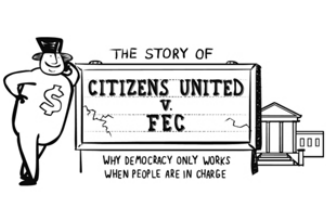 Citizens United v. FEC's impact on US democracy Citizens United v. FEC's impact on US democracy Tags: capitalism, corporations, crime/law/deviance, government/the state, politics/election/voting, campaign financing, citizens united v. federal election commission, democracy, power elite, supreme court, 06 to 10 mins Year: 2014 Length: 8:50 Access: YouTube Summary: This short video created by The Story of Stuff Project explores the relationship between wealth and political power, and examines whether we can speak of democratic elections in the United States. As the video points out, Americans have lost power in their democracy because of modern corporations' single-minded focus on maximizing profits, which have rapidly grown. Although the government can, and should, intervene by setting ground rules to protect society and keep things safe and fair, the reality of the current situation is that corporations, rather than people, write the rules. With Citizens United v. Federal Election Commission (FEC) in 2010, the Supreme Court decided that it is unconstitutional to put any limit on corporations’ financial contribution to elections because it violates free speech (this also invalidated part of the McCain-Feingold Campaign Finance Reform Law). As a result of this decision, corporations can now spend unlimited sums to help elect or defeat political candidates, which makes campaign financing undemocratic. The total cost of elections (congregational and presidential) almost doubled after Citizens United v. FEC, growing from $3.6 billion in 2010 to $6.2 billion in 2012. As the video highlights, the First Amendment was written to protect real people, not corporations. How can people be in charge of democracy again? First, there is a need for a constitutional change, which would overturn the Supreme Court's decision by establishing that corporations do not have the same First Amendment rights as people. Second, in order to eliminate the power of corporations in manipulating the elections, public financing of campaigns needs to be regulated, not liberated. Finally, given that 85% of Americans feel that corporations have too much power and individuals have too little, people should speak up and take social action by fighting for the things people (and not corporations) care about, such as renewable energy, green jobs, health care, safe products, and good-quality education. Submitted By: Nihal Çelik 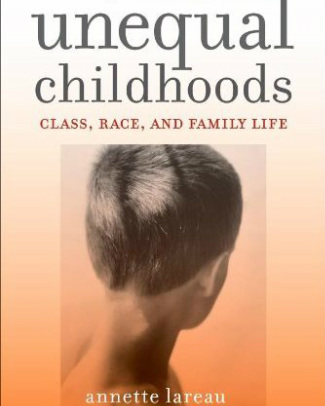 Kids' exposure to language can reproduce class inequality. Kids' exposure to language can reproduce class inequality. Tags: children/youth, class, culture, discourse/language, education, inequality, marriage/family, annette lareau, child-rearing, 00 to 05 mins, 06 to 10 mins Year: 2011, 2014 Length: 8:25; 0:57 Access: YouTube (8:25) New York Times (0:57) Summary: In her book, Unequal Childhoods, Annette Lareau describes how different child-rearing strategies in upper-middle class and poor/working-class homes reproduces class inequality. The way that parents use language with their children is one of several dimensions of family life that help to reproduce this class inequality (the variety of differences are illustrated in our previous post). Lareau found that in upper-middle class homes (through a process she calls concerted cultivation), children are exposed to wider vocabularies, taught to contest adult statements, use language in extended negotiations with parents, and learn through a combination of reasoning and directives. Comparatively, in working-class and poor homes (through the accomplishment of natural growth), children are exposed to fewer words, rarely question or challenge adults, learn more through directives, and generally accept the directives they are given. The first video supplements these findings in how language use varies across class. Todd Risling provides commentary on his study conducted with Betty Hart and published in their book, Meaningful Differences in the Everyday Experiences of Young American Children (1995). They recorded the number of words spoken to young children in welfare-supported homes, working-class homes, and white-collar professional homes. Their findings showed that, on average, children in professional homes were exposed to 1500+ more words per hour than children in welfare-supported homes. So after 1 year, this class difference led to an 8 million word gap, and by age 4, this produced a total gap of 32 million words. In addition to these variations in vocabulary and syntax, when exposed to more words, children were also more likely to hear more positive and affirmative statements, thus promoting better emotional outcomes. Furthermore, these levels of talking are strongly correlated with standard IQ scores. Their study provides quantitative support for class differences in vocabulary and emotional development, while Lareau's qualitative study shows the ways that children learn to use that language (which will later help them in professional contexts) and develop a sense of entitlement through these interactions with adults. Together, these differences help to provide middle-class children with advantages in educational and occupational settings. The second video briefly discusses a technology and strategy that can help address this inequality in language use. The child wears a small digital language processor that records interactions with the child, uploads the data to the cloud, and is then used to give feedback on how to incorporate language in everything the family does during the day. Viewers might be encouraged to consider other programs and strategies for addressing the language gap across social class. Submitted By: Paul Dean  "The Big Questions" tackles the question of reparations "The Big Questions" tackles the question of reparations Tags: discourse/language, globalization, inequality, knowledge, prejudice/discrimination, race/ethnicity, colonialism, color-blindness, color-blind racism, laissez-faire racism, neocolonialism, postcolonialism, reparations, slavery, 06 to 10 mins Year: 2014 Length: 9:23 (21:28) Access: Atlanta Blackstar (Full episode: YouTube) Summary: Is it time for the West to begin paying reparations for its role in enslaving African people? The question cannot really be about the timing of reparations, for if blacks are owed any money at all for the chattel slavery their ancestors experienced, then the time for reparations is certainly long overdue. The real question is whether reparations should be paid at all, and as with so many other issues pertaining to race and racism in the United States, one's view of the matter will likely depend on one's race. Writer Ta-Nehisi Coates recently penned a data-driven cover story on the topic for The Atlantic, and in the above video, scholar-activist, Esther Stanford-Xosei comments on the fact that in March of this year, Caricom, the organization Caribbean nations work through to coordinate economic decisions, approved a plan for seeking reparations from colonizing countries including Great Britain. I want to use this video to help explain why discussions about reparations—and so many other issues pertaining to racial inequality—frequently result in a deadlock between whites and people of color, colonizers and the colonized. At about the 35-second mark, the white conservative politician, Daniel Hannan, argues that reparations should not be paid to the descendants of slaves because, as he puts it, "Slavery was universal...if you're looking at paying reparations, anyone whom you choose to pay is statistically certain to be descended both from the owners and the owned." By this logic, whites are just as entitled to reparations as blacks. Hannan's position is common among whites in the West and cannot be easily dismissed as simply evil or consciously racist; rather it is important to see that he and others hold this conclusion because they subscribe to a set of ideas, which together form the basis of what sociologist Lawrence Bobo calls laissez-faire racism. Bobo uses this term to refer to the fact that the institutionalized disadvantages people of color continue to face—which are both measurable and observable—are now accepted and even condoned based on the faulty premise that within the framework of a modern free market, people of all races have an equal shot at economic success. Thus, for the laissez-faire racist, if it is true that people of color are more likely to be poor than whites, it can only be because they are not lifting themselves up by their bootstraps. The fact is the experience of colonialism has left an enduring mark on the way modern institutions dole out privileges and resources, but in more tangible terms, the machinery of colonialism has meant that wealth accumulated for the white colonizers, and that wealth continues to be passed down to their descendants. Even if the market and its institutions truly regarded people of all races equally, people of different races are not participating in the market with anything close to the same chest of resources. Submitted By: Lester Andrist 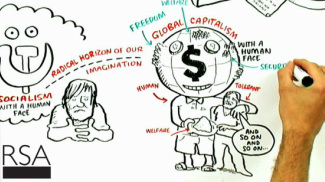 Žižek argues charitable consumption prolongs capitalism's ills. Žižek argues charitable consumption prolongs capitalism's ills. Tags: capitalism, consumption/consumerism, corporations, culture, economic sociology, marketing/brands, marx/marxism, political economy, theory, charity, corporate social responsibility, cultural capitalism, morality, starbucks, žižek, 06 to 10 mins Year: 2010 Length: 10:56 Access: YouTube Summary: In this animated segment of a longer lecture, Slavoj Žižek critiques the cultural dimensions of contemporary capitalism. Žižek begins by stating how capitalism has changed from a dichotomy between production and traditional charity (e.g. Soros earns money by exploiting workers then gives it back to humanist causes), to a form of capitalism that brings the dimensions of morality and consumption together. He offers several examples of this "cultural capitalism," including Starbucks and Tom's Shoes. In each of these instances, the act of consumption and doing good are part of the same process, which has now been universalized throughout capitalism. It is meant to make people (i.e. consumers) feel good about themselves in that they are helping poor people or a degraded environment. However, Žižek argues that by participating in this system, consumers are actually "prolonging the disease ... rather than curing it." He promotes changing the structure rather than this sort of charitable act: "The proper aim is to try and reconstruct society on such a basis that poverty would be impossible and the altruistic virtues have really prevented the carrying out of this aim." He compares this system to slave owners who were kind to their slaves because they prevented oppressed slaves from realizing the core injustice of slavery; in other words, it suggests that we are doing enough to address the system's ills and prevents more significant change. While there is an implicit argument to do away with capitalism here, Žižek explicitly states that 20th century socialism was a "mega catastrophe" and does not promote a return to that system. The clip also works well to initiate critical discussions of corporate social responsibility, Fair Trade, and other social certifications, and begin to imagine what more radical alternatives might look like. Submitted By: Paul Dean  Race and gender shaped the media's "thug" portrayal of Sherman. Race and gender shaped the media's "thug" portrayal of Sherman. Tags: discourse/language, emotion/desire, gender, intersectionality, media, prejudice/discrimination, race/ethnicity, sports, American football, racialized masculinity, racism, 06 to 10 mins Year: 2014 Length: 6:39 Access: msnbc Summary: On January 19, 2014, the Seattle Seahawks defeated the San Francisco 49ers in a game thrilling victory that secured their spot in Super Bowl XLVIII (which they went on to win). Immediately following the Seahawks' defeat over the 49ers, Seattle cornerback Richard Sherman gave an emotional, on-field post-game interview with FOX Sports reporter Erin Andrews. In the interview, Sherman portrayed a loud and brash display of aggression, in which he “trash talked” San Francisco receiver Michael Crabtree. In this clip, political commentator and TV host Chris Hayes highlights how the media framed Sherman--a black football player--as a “thug” after the interview. Hayes discusses the framing of black men and athletes as violent and hypermasculine with Dr. Jelani Cobb from the University Connecticut. This clip would be useful to guide discussions on the intersections of race and gender, racialized masculinity, and perceptions of threat and violence. Submitted By: Denae Johnson 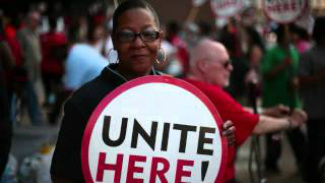 An arts-based exploration of global capitalism's contradictions. An arts-based exploration of global capitalism's contradictions. Tags: art/music, capitalism, class, globalization, historical sociology, inequality, marx/marxism, race/ethnicity, social mvmts/social change/resistance, alienation, counter-hegemony, crisis, ideology, patriarchy, social justice, subtitles/CC, 06 to 10 mins Year: 2013 Length: 6:20 Access: YouTube Summary: Blind Eye Forward (BEF) is an attempt to convey in words, music, and imagery the contradictory character of contemporary global capitalism, with attention to its historical formation, the social and ecological maladies that issue from its logic of dispossession and commodification, and the movements that, in response to those maladies, are struggling for a better world. A minor blues accompanied by still images and popular-cultural video clips, BEF begins at an ideological juncture and moves successively through issues of militarism, alienation and reification, and the challenge of creating the new within an obdurate present. In its middle part, which is carried musically by an extensive guitar solo, the piece moves through a world-historical narrative of colonial dispossession, slavery and the construction of "race", patriarchy, and capital and class. The final verse, though pessimistic, invites us to keep a red rose fastened to our chest, and to temper our pessimism with a Gramscian optimism of the will. Blind Eye Forward is useful as a discussion piece in learning contexts that problematize social inequality and the irrationalities of capitalism, within a broadly Marxist perspective. Pedagogically, it employs an arts-based approach, which can complement more expository communicative styles. Students generally find it both inspiring and troubling. It is important to reserve time after showing it in class for comments, questions, and dialogue. (Note: The piece does not have subtitles but the complete lyrics can be accessed by clicking "show more" under the description on the YouTube site.) Submitted By: William K. Carroll |
Tags
All
.
Got any videos?
Are you finding useful videos for your classes? Do you have good videos you use in your own classes? Please consider submitting your videos here and helping us build our database!
|
 RSS Feed
RSS Feed
